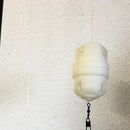Introduction: 3D Printed Ball and Stand
This instructable shows how to make a 3D printed ball that is similar to a soccer ball. The parts making up the ball requires 20 hexagons and 12 pentagons. These pieces 'snap' together to eventually make the final shape. Each pentagon and hexagon has a relief area where you can place most any rigid material. You can purchase the STL files on my ETSY page at BritzDesigns.
Step 1: Printing the Pieces
This might take awhile depending on your printer. The pentagon shape (5 sided) requires 12 pieces and the hexagon (6 sided) requires 20 pieces. I cheated and made a vertical array of each so my printer just kept printing on the top of the previous one (my printer uses break-away material). This works best to avoid running out of table space - however, if your printer does not use breakaway material, you will have to do one at a time. I haven't tried printing these parts standing on its side but that may be an option to cram more of these on your table.
The design of the parts has the correct angle to follow the circular ball shape and the pieces snap together so now glue or similar is required. Once you get enough parts, you can start the assembly.
Step 2: Fill in the Blanks
Now that your ball is assembled, you have the option to place material in each frame. I used PCBs (printed circuit boards) for the hexagons since this ball was intended as a gift for a tech person. For the pentagons - well still TBD. I was going for a contrasting color and possibly place a laser etched text of past accomplishments but so far I haven't worked out the details. Regardless, you can place anything you like on the pentagons and hexagons from wood, plastics, cardboard, pictures, you name it. Each relief is an 1/8" deep so there are a wide variety of materials you can use.
Well, the ball just sitting on the table didn't seem complete so I made a stand as well. I started with the petal shape 3D printed stand and went from there. It needed to be large enough to hold the ball and without the ball accidently rolling off. For the stand, as long as your printer has an 8" table or larger, you should be able to make it. Ideally, you would use a hollow or sparse printing option to avoid using a bunch of material because it is a large part.
Step 3: Final Presentation
The 3D printed petal shaped stand wasn't enough so I made a wooden base from black walnut. There is also a brass collar made from bushing material that ties the base into the PCB gold plating. A few final touches such as a brass nameplate and of course, whatever I fill the pentagon voids with, and this project will be complete.
Thanks for looking!
Bret













